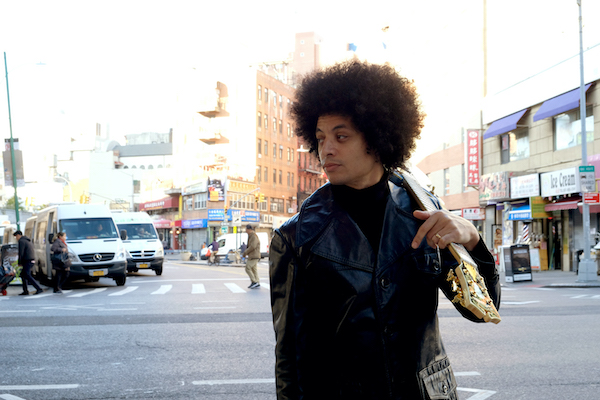Jan 13, 2026 2:09 PM
More Trump-Kennedy Center Cancellations
The fallout from the renaming of the John F. Kennedy Center for the Performing Arts to include President Donald…

Singer José James is releasing No Beginning No End 2 on Rainbow Blonde Records, which he co-founded with singer-songwriter Talia Billig and sound engineer Brian Bender.
(Photo: Janette Beckman)“Turn Me Up,” a single off José James’ upcoming No Beginning No End 2, radiates like an anthem. Inside an enticing groove, he sings, “I’m feeling good, baby, and I’m feeling free/ And yes, I’m young, gifted and black, so just let me be.”
Celebrations are in order not just because James has an album that showcases some of his best songwriting to date, but it’s being released on Rainbow Blonde, a new label the vocalist co-founded with singer-songwriter Talia Billig and sound engineer Brian Bender.
“It’s such a blessing to have founded a label. I honestly couldn’t have asked for a better team,” James said. “Talia brings all her experience from working with Blue Note Records, and Brian brings so much audio-engineering experience as a producer; he’s a musician as well. They’re also friends of mine, and we’ve been working together for years.
James offers the new album, which is due out March 6, as a sequel to his 2012 Blue Note debut, No Beginning No End. Both recordings boast a vibe that fuses the warm analog sounds of the 1970s with contemporary hip-hop-centric pulses.
“The late ’70s is a beautiful, overlooked point of reference,” James said, noting the emergence of Elton John, Roberta Flack, James Taylor and Carole King, as well as the popularity of funk, disco and reggae during the decade. “There was a moment in American music where you had all of these seemingly disparate styles coming into power at the same time. And they were all hiring jazz musicians in the studios to help create this new tapestry. That ’70s sound—that warmth—still reverberates within me.”
When James made No Beginning No End, he and Bender worked closely with performers like bassist Pino Palladino and keyboardist Robert Glasper. The sequel features bassist Ben Williams, drummer Jamire Williams and a raft of vocalists like Lizz Wright, Ledisi, Aloe Blacc and Laura Mvula. And in keeping with its predecessor, No Beginning No End 2 places an emphasis on songwriting and production, rather than centering on a specific genre.
The new album also features radio-friendly bangers like “I Need Your Love,” a sensual medium-tempo duet with Ledisi, the shuffling two-stepper “Baby Don’t Cry” and the glimmering “Feels So Good.” Other highlights include “Saint James,” an introspective ballad about James’ experiences as a martyr in toxic romances, and “Oracle,” a gorgeous soul-searching lament, co-written by Billig.
“I wanted to end the album with ‘Oracle,’ because it’s like a moment of ascension and peace,” he explained. “There’s always some spirituality involved with my music.”
No Beginning No End 2 comes on the heels of James’ 2018 exploration of Bill Withers repertoire, Lean On Me (Blue Note). The three years the singer spent performing, touring, recording and interacting with Withers had a profound effect on his songwriting: James learned how to be more direct in his lyrics.
“There’s an obtuseness within contemporary jazz, which I love. But there is something so direct about ‘Lean On Me’ or ‘Lovely Day,’” James said. “To see people in places like Japan and throughout Europe sing and know all the words to those songs, and to see the joy those songs evoked, really made me feel good.”
“In the era where Death Row Records is now owned by Hasbro, once you sign on the dotted line with a major record label, you just don’t know where your creative capital is going to land,” James said. “For Talia, Brian and me, it’s really important to know that our music has a safe home and a destiny.”
The label aims to capture a diversity of music while also serving as a platform for a diverse roster in terms of race, gender, ethnicity and sexual orientation. “A record label should reflect the times that it exists in as a societal function,” James said. “Jazz plays a huge piece in our vision. But it’s important for us to see Rainbow Blonde being perceived as something broader than jazz. We’re a label for creative voices who have a vision of how they want to be presented to the world.” DB

Belá Fleck during an interview with Fredrika Whitfield on CNN.
Jan 13, 2026 2:09 PM
The fallout from the renaming of the John F. Kennedy Center for the Performing Arts to include President Donald…

Peplowski first came to prominence in legacy swing bands, including the final iteration of the Benny Goodman Orchestra, before beginning a solo career in the late 1980s.
Feb 3, 2026 12:10 AM
Ken Peplowski, a clarinetist and tenor saxophonist who straddled the worlds of traditional and modern jazz, died Feb. 2…

The success of Oregon’s first album, 1971’s Music Of Another Present Era, allowed Towner to establish a solo career.
Jan 19, 2026 5:02 PM
Ralph Towner, a guitarist and composer who blended multiple genres, including jazz — and throughout them all remained…

Rico’s Anti-Microbial Instrument Swab
Jan 19, 2026 2:48 PM
With this year’s NAMM Show right around the corner, we can look forward to plenty of new and innovative instruments…

Richie Beirach was particularly renowned for his approach to chromatic harmony, which he used to improvise reharmonizations of originals and standards.
Jan 27, 2026 11:19 AM
Richie Beirach, a pianist and composer who channeled a knowledge of modern classical music into his jazz practice,…